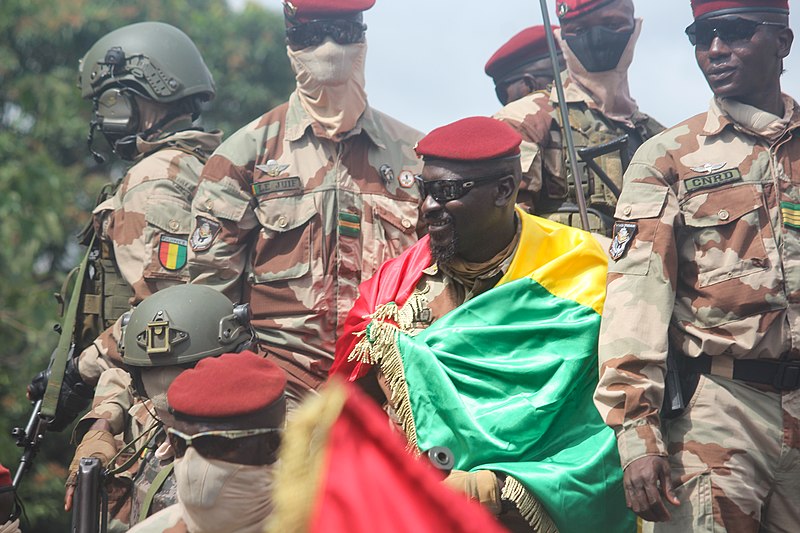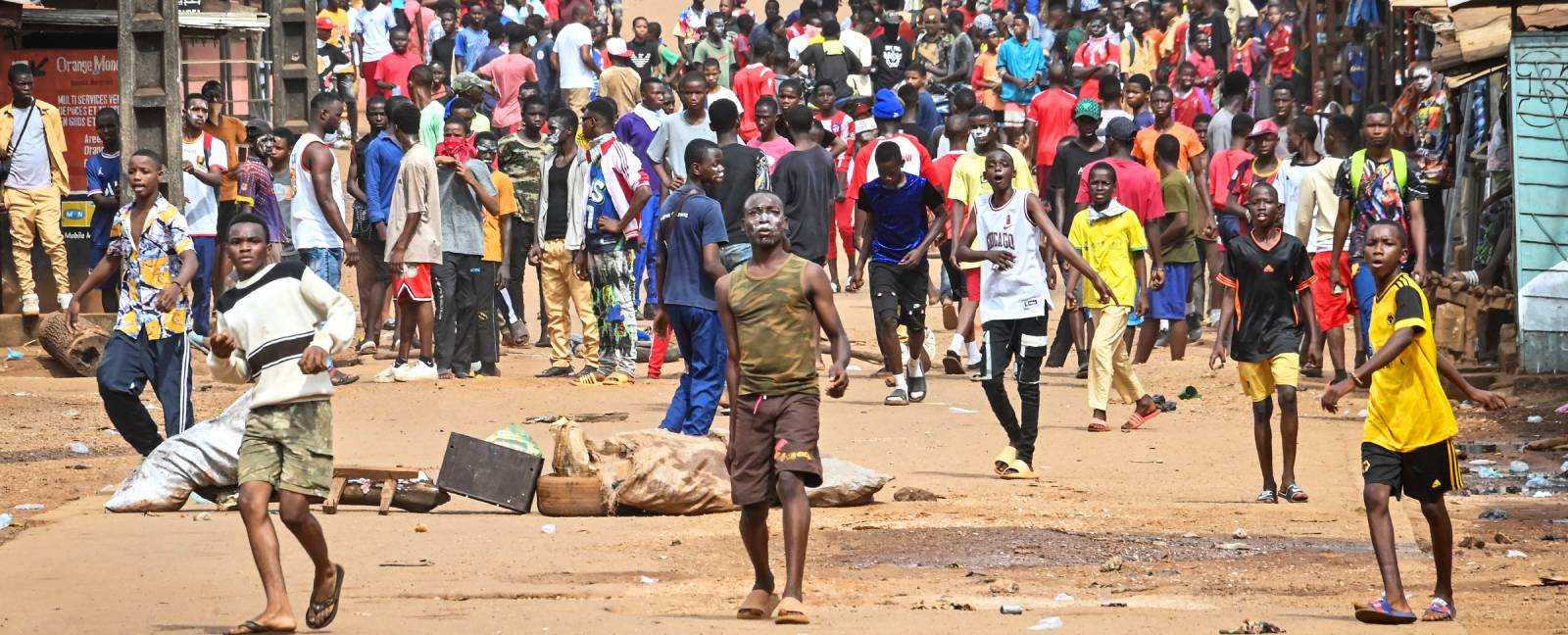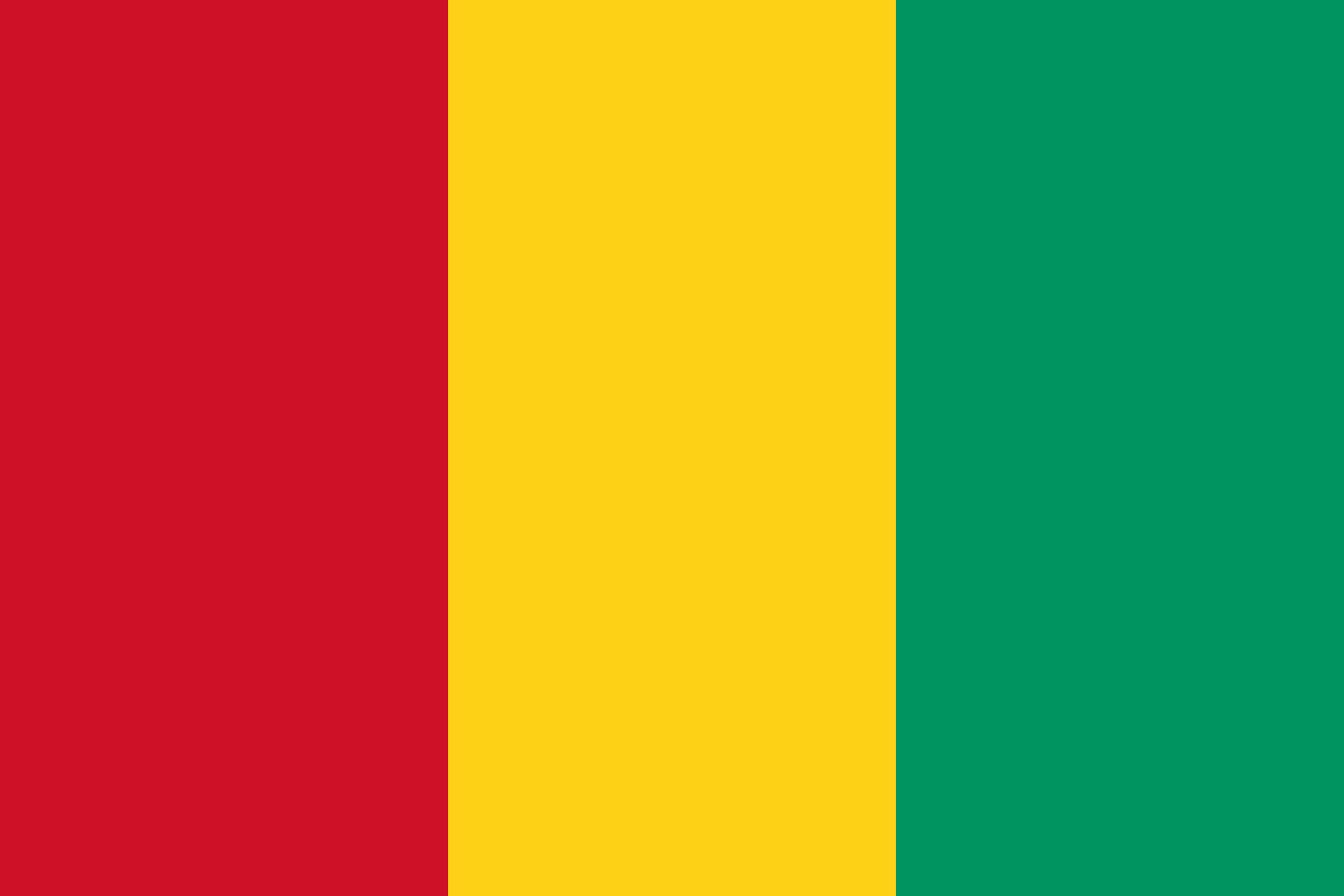« Previous: Seychelles (December)
Next: Cameroon (October 5) »
Presidential and Legislative Elections
September-October
The military junta led by then-Colonel Mamadi Doumbouya has announced plans to hold delayed presidential and legislative elections in 2025. This move comes after the military failed to hold promised elections in December 2024, and has showed little commitment to transitioning back to democratic government.
The Guinean junta’s transition roadmap has consistently lacked transparency, timeliness, or adequate budgetary commitments.
The junta seized power from Guinea’s first democratically elected president, Alpha Condé, in September 2021.
Expectations are that Doumbouya will contest for the presidency in the planned elections despite the junta repeatedly saying that all members of the transitional military authority would be barred from serving in a new government.
To pave the way for Doumbouya’s candidacy, the junta is expected to organize a constitutional referendum in May 2025 that would set the terms for the election. Junta members now refer to Doumbouya as President of the Republic, rather than President of the Transition as they had previously.
The junta’s change in tact to pursue elections appears aimed at following the blueprint developed by General Mahamat Déby in Chad, who oversaw a highly orchestrated national dialogue, constitutional referendum that allowed junta leaders to run for elections, and then perfunctory elections in 2024.
The Guinean junta’s 10-point transition roadmap negotiated with the Economic Community of West African States (ECOWAS) has consistently lacked transparency, timeliness, or adequate budgetary commitments. This has led many civil society leaders to question the junta’s commitment to the transition.

Leader of Guinea’s Junta, Mamadi Doumbouya (C). (Photo: Aboubacarkhoraa)
This view is reinforced by the increasing militarization of the Guinean government. In 2022, Doumbouya replaced the country’s 34 civilian prefects with military officers. In March 2024, Doumbouya dissolved the country’s 342 elected municipal councils, directly appointing their 3,000 replacements. Among other responsibilities, municipal councils are typically charged with organizing elections.
Guinea’s main political parties and civil society organizations, organized under the banner of the Forces vives de Guinée (FVG), have mounted periodic protests (even though these have been banned since 2022) against the junta’s unilateral and opaque control of the transition process. Opposition leaders contend that any election administration or voter registration process should be managed by independent bodies to limit conflicts of interest. Similarly, any constitutional reforms should wait until there is a legitimate, democratically elected government in place.
The junta has responded to such protests with violent crackdowns resulting in dozens of deaths. The military has applied similarly heavy-handed tactics by suspending more than 50 opposition parties, while deeming others “under observation.” Rallies organized in support of Doumbouya, by contrast, are allowed.
Three members of the Guinean opposition—Oumar Sylla (also known as Foniké Menguè), Mamadou Billo Bah, and Mohamed Cissé—were arrested at Menguè’s home in Conakry on July 9, 2024, and taken to a detention facility on Kissa, an island off Conakry, where they were allegedly tortured. While Cissé was eventually released, Menguè and Bah remain unaccounted for. These abductions represent a pattern of escalating harassment, jailings, and trials against critics of the junta, including popular rapper Djanii Alfa. Also in 2024, opposition leader Aliou Bah was picked up by men in uniform and quickly sentenced to 2 years in prison for “offending” Doumbouya.
Resistance to military rule points to Guinea’s resilient civil society and democracy movement.
Members of the Guinean bar have gone on strike to protest the arbitrary arrests and unlawful detentions of Guinean citizens.
Media space is also shrinking, limiting information into and out of Guinea. The junta has restricted internet access, stopped television and radio stations from broadcasting, and pursued a crackdown on independent private media. Sékou Jamal Pendessa, the secretary general of Guinea’s Union of Professional Journalists, was sentenced in February 2024 to 6 months in jail for organizing a protest and threatening public order and the dignity of people through information technology. In July, two media regulators, Djene Diaby and Tawel Camara, from the 13-member High Authority for Communication, were convicted of defaming the head of state after they claimed that the junta had bribed the executives of two (since banned) popular media outlets in exchange for positive coverage.
This resistance to military rule points to Guinea’s resilient civil society and democracy movement. Guinea was one of the last African countries to realize competitive multiparty elections, which did not occur until 2010. This milestone was reached only after the infamous 2009 stadium massacre of more than 150 civilian protesters and the rapes of dozens of women orchestrated by the military government of Moussa Dadis Camara.

Citizens swarm the streets after the outlawed opposition coalition, The National Front for the Defence of the Constitution (FNDC), called for protests against the ruling junta in Conakry on October 20, 2022. (Photo: AFP)
Citizen rejection of military rule in Guinea is based on a long legacy of repressive, unaccountable authority. Guineans suffered greatly under the 25-year dictatorial reign (1958–1984) of Ahmed Sékou Touré, followed by the 24-year regime (1984–2008) of General Lansana Conté. These hardships and hard-earned rights have seared a deep commitment for democracy in the Guinean psyche.
Under the Doumbouya junta, Guinea is suffering from worsening economic strains. Acute food insecurity has skyrocketed to an estimated 11 percent of Guinea’s 14 million people (from 2.6 percent in 2020). Over a million Guineans are now facing food crisis—one of the African countries with the largest increases in populations facing acute food insecurity over the past year. Fuel shortages have become chronic and with annual inflation hovering at 11 percent, access to basic goods is becoming increasingly difficult.
A return to a democratic trajectory would open the country to renewed investment, development, and economic growth.
A return to a democratic trajectory would open the country to renewed investment, development, and economic growth. In its decade of democratic progress, Guinea realized an inflation-adjusted median annual per capita economic growth rate of 2.9 percent. This compares to economic growth of less than 1 percent for the 25-year period before 2010.
A return to civilian democratic rule would also open Guinea’s military to a more robust spectrum of security cooperation funding and training—which could be critical as the militant Islamist insurgency in Mali spreads ever closer to Guinea’s northern border.
Russian interventions to derail the Guinean democratic transition can be expected given Russia’s long involvement in bauxite mining in Guinea, Russia’s outsized influence with neighboring Sahelian military juntas, and the Kremlin’s purposeful efforts to undermine democracy elsewhere in Africa.
Guineans’ pushback against the junta’s gambit to extend its rule is a continuation of the country’s long struggle for democracy in the decades before 2010. That is the fundamental subtext to Guinea’s 2025 electoral calendar. The key issue to watch, then, is the degree to which electoral processes are independently administered versus a military managed exercise that perpetuates military rule under a new name.
Hany Wahila is a Research Assistant with the Africa Center for Strategic Studies.
Previous
« Seychelles (December)
Next
Cameroon (October 5) »


 Guinea: Despite Protests, Military Junta Angles to Perpetuate Its Hold on Power
Guinea: Despite Protests, Military Junta Angles to Perpetuate Its Hold on Power